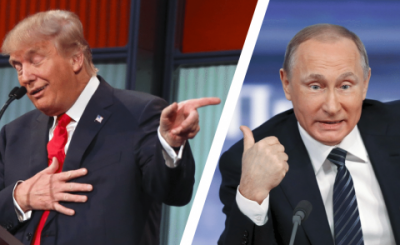The Trump-Putin Meeting and the Fate of the Earth

Any truthful way to say it will sound worse than ghastly: We live in a world where one person could decide to begin a nuclear war — quickly killing several hundred million people and condemning vast numbers of others to slower painful deaths.
Given the macabre insanity of this ongoing situation, most people don’t like to talk about it or even think about it. In that zone of denial, U.S. news media keep detouring around a crucial reality: No matter what you think of Donald Trump or Vladimir Putin, they hold the whole world in their hands with a nuclear button.
If the presidents of the United States and Russia spiral into escalating conflicts between the two countries, the world is much more likely to blow up. Yet many American critics of Trump have gotten into baiting him as Putin’s flunky while goading him to prove otherwise. A new barrage of that baiting and goading is now about to begin — taking aim at any wisps of possible détente — in connection with the announced meeting between Trump and Putin at the G-20 summit in Germany at the end of this week.
Big picture: This moment in human history is not about Trump. It’s not about Putin. It’s not about whether you despise either or neither or both. What’s at stake in the dynamics between them is life on this planet.
Over the weekend, more than 10,000 people signed a petition under the heading “Tell Trump and Putin: Negotiate, Don’t Escalate.” The petition was written by RootsAction to be concise and to the point:
“We vehemently urge you to take a constructive approach to your planned meeting at the G-20 summit. Whatever our differences, we must reduce rather than increase the risks of nuclear war. The future of humanity is at stake.”
A war between the world’s two nuclear superpowers could extinguish human life on a gigantic scale while plunging the Earth into cataclysmic “nuclear winter.”
“Recent scientific studies have found that a war fought with the deployed U.S. and Russian nuclear arsenals would leave Earth virtually uninhabitable,” wrote Steven Starr, a senior scientist with Physicians for Social Responsibility. “In fact, NASA computer models have shown that even a ‘successful’ first strike by Washington or Moscow would inflict catastrophic environmental damage that would make agriculture impossible and cause mass starvation.”
The Bulletin of the Atomic Scientists explains why, since last year, it has moved the risk-estimate “Doomsday Clock” even closer to apocalyptic midnight — citing as a major factor the escalation of tensions between the U.S. and Russian governments.
So, the imminent meeting between Trump and Putin will affect the chances that the young people we love — and so many others around the world — will have a future. And whether later generations will even exist.
I put it this way in a recent article for The Nation:
“Whatever the truth may be about Russian interference in the U.S. election last year, an overarching truth continues to bind the fates of Russians, Americans and the rest of humanity. No matter how much we might wish to forget or deny it, we are tied together by a fraying thread of relations between two nations that possess 93 percent of the world’s nuclear weapons. Right now it is not popular to say so, but we desperately need each other to enhance the odds of human survival.”
In that overall context, stoking hostility toward Russia is, uh, rather short-sighted. Wouldn’t it be much better for the meeting between Trump and Putin to bring Washington and Moscow closer to détente rather than bringing us closer to nuclear annihilation?
Norman Solomon is the coordinator of the online activist group RootsAction.org and the executive director of the Institute for Public Accuracy. He is the author of a dozen books including “War Made Easy: How Presidents and Pundits Keep Spinning Us to Death.”
Licensed under Creative Commons. The original source of this article is CounterPunch.

